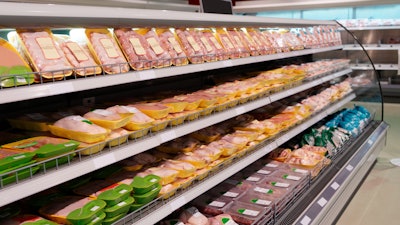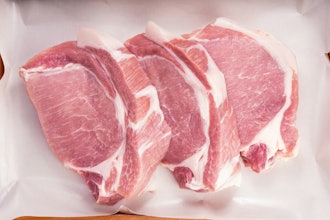
WASHINGTON — The North American Meat Institute said Thursday that meat and poultry producers are leaning in to continue efforts to meet the global demand for meat under difficult circumstances.

Meat and poultry retail sales increased 7.3 percent for the week ending March 8, and deli meat sales advanced 4.8 percent due to a shift from foodservice production. (Data and insights provided by IRI and 210 Analytics, LLC.) For more detailed information go here.
“In these uncertain times, the data shows consumers are turning to meat and poultry to provide their families with the nourishment and comfort they need,” Potts said. “Our members are committed to meeting this need.”
Recognizing the pressure on employees, especially hourly employees with children out of school and daycare, companies have acted immediately to enhance benefits, including paid sick leave and improving access to health care to treat or detect the virus and waiving co-pays and deductibles. The Meat Institute is working with members and the federal government to anticipate and address other labor concerns.
Companies are educating employees on Centers for Disease Control and Prevention (CDC) guidelines to prevent the spread of Coronavirus. They also recognize the critical value of the personal effort and sacrifice of employees up and down the food supply chain.
“Perhaps most important is the generosity of member companies in donating meat or funds to foodbanks and other charities to support those in need in their communities,” said Potts.
The Meat Institute is working with livestock groups, food and beverage industry trade associations, manufacturing organizations, USDA, congress and the White House to ensure meat and poultry producers can operate as critical infrastructure.
“Member plants must be allowed to keep running to provide critical protein to the food supply chain,” said Potts. “The Meat Institute is encouraging members to work with state and local health authorities to enhance their understanding of meat production, especially the extensive and frequent cleaning and sanitation of facilities.”
Communicating industry concerns to USDA’s Food Safety and Inspection Service, the Meat Institute sought and gained assurances that inspection service will continue and that actions are being taken to address labor shortages caused by the Coronavirus pandemic.
The Meat Institute signed a letter to federal, state, and local leaders across the country urging them to follow federal guidelines in exempting meatpacking facilities, including suppliers and truck drivers, from gathering restrictions and curfews related to the Coronavirus. Emerging inconsistent policies have created confusion and delay in several areas of the United States.
Mindful of the disruption the Coronavirus pandemic has caused in the cattle markets, the Meat Institute is working with the National Cattlemen’s Beef Association and committed to do everything it can to alleviate the adverse effects the pandemic is having on these critically important suppliers.
“Everyone benefits from a transparent marketing system that ensures effective price discovery,” said Potts, “Simply put, packers need cattle producers and cattle producers need packers, and the nation’s consumers need us working together.”
The North American Meat Institute is the leading voice for the meat and poultry industry. The Meat Institute’s members process the vast majority of U.S. beef, pork, lamb, and poultry, as well as manufacture the equipment and ingredients needed to produce the safest and highest quality meat and poultry products.






















